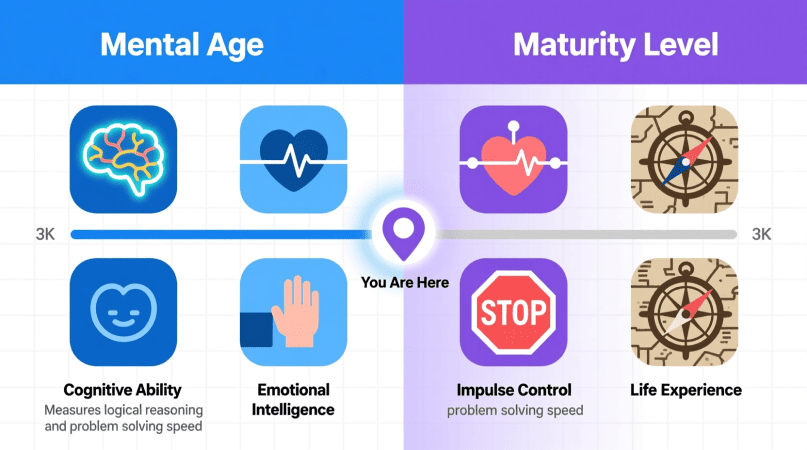
Most people have asked themselves at some point: “Why do I feel older than my age?” or “Why do I still react like a teenager even though I’m an adult?”
That’s where the difference between mental age and maturity becomes important. They’re related but not the same—and understanding both can help you learn more about yourself, your relationships, and your growth path.
What Is Mental Age?
Mental age describes how your cognitive abilities—reasoning, memory, problem-solving—compare to the average person of a certain age.
The idea comes from early IQ research: if a 12-year-old could solve problems like an average 15-year-old, their “mental age” was considered 15.
Learn how emotional maturity develops differently from mental growth.
Key points about mental age:
- It reflects intellectual development, not emotional skills.
- It can be higher, lower, or the same as your chronological age.
- It’s influenced by education, environment, and natural aptitude.
- A “mental age test” usually looks like puzzles, logic questions, or pattern recognition tasks.
But intelligence is only one part of being human—which brings us to maturity .
What Is Emotional Maturity?
Emotional maturity is the ability to regulate your emotions, handle responsibility, and maintain healthy relationships.
Unlike mental age, it’s not measured by IQ questions but by how you react in everyday life.
Signs of emotional maturity:
- Staying calm under stress instead of lashing out.
- Taking responsibility instead of blaming others.
- Listening and empathizing in conversations.
- Making thoughtful decisions, even when emotions are high.
Brain science supports this: while cognitive skills develop in the teen years, the part of the brain responsible for self-control and judgment (the prefrontal cortex) doesn’t fully mature until the mid-20s or later.
Use our detailed guide to compare mental age and maturity across different traits.
Mental Age vs Emotional Maturity: The Real Difference
Here’s a simple way to see the contrast:
| Aspect | Mental Age | Emotional Maturity |
|---|---|---|
| Focus | Intelligence, reasoning, problem-solving | Emotional regulation, social behavior |
| Development Peak | Teens to early 20s | Mid-20s to 30s (brain fully matures) |
| Commonly Measured By | Quizzes, IQ-style tasks | Situational questions, life choices |
| Example | Solving a complex math puzzle | Handling criticism with calmness |
You might know someone brilliant at work but poor at managing conflict—that’s high mental age, low maturity.
Or you might know a kind, emotionally wise person who struggles with academics—that’s high maturity, lower mental age.
Understand how our mental age test works and what factors it measures.
Why the “Maturity Gap” Matters
Psychologists call the difference between intellectual and emotional development the maturity gap.
- Teens often have adult-level reasoning skills but not the emotional self-control to match.
- This gap explains impulsive decisions, risk-taking, or difficulty handling responsibility.
- With time, maturity usually catches up, but for some, it requires conscious effort and self-reflection.
Understanding where you fall on each side can help you know what to work on.
The Mental Age vs Maturity Test
A good test should measure both sides:
- Cognitive tasks: logic puzzles, memory challenges, pattern recognition.
- Maturity questions: “How do you respond when criticized?” or “What do you do if a friend cancels plans last minute?”
When combined, you get a clearer picture of your thinking age and your emotional growth level.
Discover simple ways to improve your mental age and achieve better emotional balance.
Interpreting Results:
- High MA + High Maturity → Balanced growth.
- High MA + Low Maturity → Smart but emotionally reactive; focus on self-awareness.
- Low MA + High Maturity → Emotionally wise but might need intellectual training.
- Low MA + Low Maturity → Room for growth in both areas.
How to Improve Emotional Maturity
Unlike mental age, maturity isn’t fixed. You can grow it with practice:
- Pause before reacting: build emotional regulation.
- Seek feedback: ask trusted friends or mentors how you handle stress.
- Practice empathy: listen fully before responding.
- Take responsibility: own your mistakes without defensiveness.
Just like training the mind, training maturity takes repetition—but the results pay off in healthier relationships and better decision-making.
Discover what influences your mindset in what affects your mental age.
FAQs About Mental Age and Maturity
1. What is the difference between mental age and maturity?
Mental age measures cognitive ability, while maturity reflects emotional and social development.
2. Can someone have a high mental age but low maturity?
Yes—think of a genius who struggles with relationships.
3. How accurate are mental age tests online?
They can be fun and reflective but aren’t scientific. Use them as a tool for self-awareness, not diagnosis.
4. When does emotional maturity develop?
Most people reach it in their mid-20s, but it can keep evolving through life.
5. Can you improve maturity?
Yes—with reflection, therapy, journaling, and real-life practice.
- The distinction between maturity and thinking style is compared in mental age vs maturity test.
- Emotional development is explained in emotional maturity.
- How tests are structured is detailed in our methodology.
- You can find out where you stand by taking the mental age test.
- The meaning of your score is shown on the results page.
- Suggestions for growth based on your outcome appear in the improvement guide.